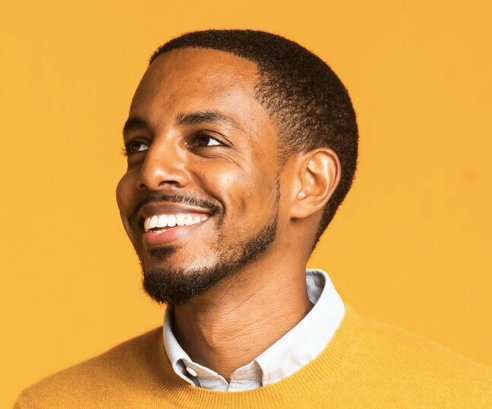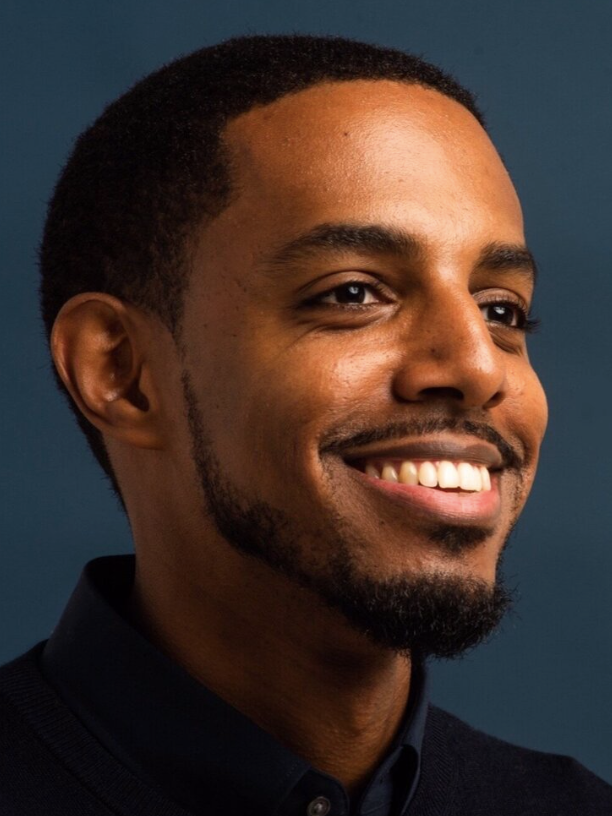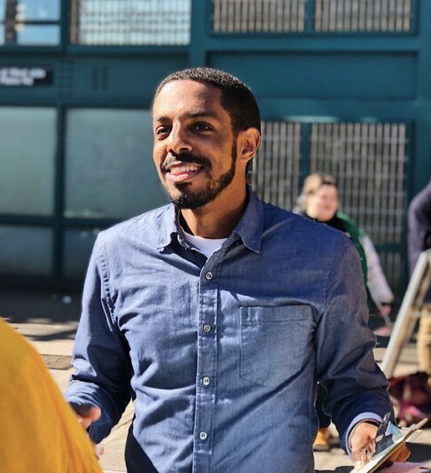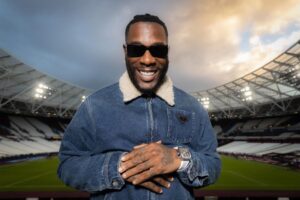
This conversation has been edited and condensed for clarity purposes.
Michael Mikail: How are you Andom? How have you been quarantining?
Andom Ghebregiorgis: I’m here in Mount Vernon, New York, right outside the city. I border New Rochelle, which was really the epicenter of the coronavirus when it really spread. But, thankfully I’ve been good. My family has been okay. Because of the protests and everything, that’s really when a lot of the sort of self-imposed quarantines ended for a lot of folks. I was pretty active in the protests as well, but right now, I’m always out with a mask, but I still go to protests and events.
MM: Okay. Let’s just jump into it. What has your experience in the protests been like? What have you been seeing and hearing?
AG: Yeah, I mean, it’s the energy, it’s not daily like it was in May and June, even in the beginning of July, so it’s a little bit slower, but there’s still a lot of energy around what this movement means, defunding the police, the NYPD in particular. What’s been great, has been to see how the mobilization with different organizations has really been a coalition of just organizations that are not necessarily all focused on abolition per se, but, they’ve all come together because they know that policing is something that affects so many different groups in society, especially vulnerable communities, irrespective of race. So that’s been a really great thing to see, to see how groups have been coming together with individuals and people. Just like to see how the Overton window on the possibilities of what policing in America will look like. Even talking about abolition, the fact that it is even something that we’re speaking about and is in the public discourse shows how much society has moved just since May 25th, but you know, a lot of people who haven’t necessarily experienced racial profiling or stop and frisk recognize that something has to change. And we’ve seen a lot of people come out and stay focused on it.
MM: Yeah, I think fractionalization is a huge issue for the progressive movement, but with you and your race, you were able to endorse (your competitor) Jamaal. So do you see that kind of coalescence being seen in the larger progressive movement?
AG: I don’t want to be cynical, but I think there were a lot of particularities to our race, which allowed that to happen. There were a lot of organizations and individuals that knew both of us and that we knew, and we had worked with that made it possible to broker a coalescence, if you will, or consolidation to allow that to happen. I feel like generally that’s not the case in most races. I don’t want to be too cynical about it, but even ours almost didn’t even happen. You know, it sort of happened by, I don’t want to say by chance, but it was very circumstantial to the race that we’re in, in the sense that I had a mutual friend that was working with an organization that ended up endorsing Jamal, and we were able to have an honest conversation about not only the stakes, we knew what the stakes were, but we were able to have an honest conversation of where all the campaigns were and what the next month would look like. Generally, you’re not able to have an open conversation like that because most campaigns are either going to lie and elevate where their campaign actually is, or they’re going to be holding their numbers and what the outlook of the campaign looks like close to their chest because they don’t want to give away that information to someone who they see as an opponent. So I think that one of the good things about our campaign was that we never saw Jamal necessarily as our adversary or even as our competition, there were a whole bunch of votes in the district that anyone could get. He was one person who was trying to get it in his campaign. Um, but it wasn’t something where I was like, “Oh, I’m going up against Jamal.” We were fighting to represent the community. The name (of the campaign) was Andom for Congress and there are 300,000 Democrats and only 30,000 of them voted. There were tons of votes out there. I think it was a little bit specific to what was happening in our, in our districts.
MM: So maybe going a little backwards, can you tell me a little about what made you run for Congress in the first place and the issues that you care about.
AG: For sure. It’s almost a funny sort of story, like after Joe Neguse (was elected) in 2018, I had all these family members saying “Andom, you see, you know, Joe Neguse? First Eritrean congressmen that dah, dah, dah.” And I’m like, “yeah, it’s really great.” And they’re like, “You know, that should be you.” I’m like “Ha, that’s so funny.” So anyway, I had a lot of family members telling me that and I was telling my friends sort of as a joke, political friends, and they were like, “You should really do it.” So I sort of had this joking, ribbing egging me on from the sidelines that I should run for office. Um, it was never a plan of mine. After college I went into the nonprofit sector and then education, which is not a traditional path to running for office. But, I think the contradictions of a lot of my life always made me aware of the fact that the American dream as it’s portrayed to be is not a reality. And so for me, I saw that growing up in Mount Vernon, I grew up in a very diverse city that had its own economic inequality that I myself was able to contrast within the different neighborhoods in my own city. But also when I would go back to Eritrea or I would hear stories that family would tell me of like, you know, my mom grew up in Addis, my dad grew up in Asmara. And so you can even have it now in a more global context. And then I went from public school to private school and I could see that, I went to Yale and then I went to city college, the public university here. So, I always was sort of exposed to the contradictions of different systems, but it was never more stark than until I became a special education teacher where I taught in a school in the Bronx that was plagued by administrative neglect, overcrowding, and violence. On top of that, I was a special education teacher soo I was teaching in many ways, the most vulnerable students in a very vulnerable school. And so for me, the reason why I ended up deciding to run is because I saw the social disinvestment that was happening within what was supposed to be a site of liberation and progress: the school. I could clearly juxtapose that and contrast that with this militaristic corporate Democrat who had no problem spending trillions of dollars on wars and prisons. To me that was something that’s irreconcilable. How do we have this really militaristic Democrat who had no problem voting for the war in Iraq? No problem sending military aid to Saudi Arabia and Israel, but like in my school we don’t even have paper or pencils. So in short, it’s not like there was one day where I was like, yeah, Eureka, you know, it’s happening, but, but that was the foundation for the injustice that I saw.

MM: Can you speak to the reasons you became a special education teacher?
AG: To be honest, I sort of fell into it. I first worked at a nonprofit right out of college and then it wasn’t really for me, a desk job. And my ex, my girlfriend at the time, was a teacher and I used to help her out, with chaperoning trips, mentoring the kids a little bit, in basketball, and things like that with them. I really liked the limited engagement I had. I always hated school. I loved learning, but I always hated school as a kid. So that was an extra motivation for me being like, “You know, there are so many things that I remember being a student that I thought if they just tweaked it in this way, it would be much more effective for all kinds of learners.” So I got into it through my girlfriend. I became a New York city teaching fellow and they placed most fellows actually in special education which I’m very thankful for because the pedagogical instruction is really important, all educators should have pedagogical training. So I was really fortunate to be honest, I was in many ways brainwashed by a lot about what American schools thought about special education, because I grew up in the nineties. In my school, the special education classroom was like in a whole other hallway, segregated from the general education population. There were no integrated classrooms in any way. And so that allowed for negative stereotypes about students with disabilities to breed. So I was very fortunate to be placed in special education. Not only to have those sort of lingering assumptions challenged, but being given the training to actually reach all kinds of learners, whether they’re neuro-diverse learners or whether they’re learners who come from different cultural backgrounds or who have different linguistic skills.
MM: Definitely, having had that experience and enjoyed it, and now having just got off your campaign, I have to ask: what’s next for Andom?
AG: To be honest, like I’ve just been sort of, uh, trying to figure out and understand the moment that we’re in, we’re coming out of this, uh, really historic pandemic, particularly here in New York, but really throughout the country it’s been escalating obviously over the last couple of weeks. New York has stabilized a bit, but the rest of the country has gotten very unmanageable. We have over 150,000 deaths. We see that so many of our governmental institutions that we’re supposed to rely on, whether they’re healthcare or education or housing, are just having complete system failures. And on top of this, we’re having mass uprisings around police brutality. So we’re really at a moment in our country where there’s an opportunity for turning points in a whole lot of directions, particularly in a more progressive direction. And so for me, I’m trying to… there’s not really a good answer, you know, I don’t know exactly what I’m going to be doing. But I’ve been trying to take part in this moment as much as possible to make sure it’s going in the most progressive direction. That really just de-commodifies the basic needs of life and ensures that these things which are necessities for survival are not privatized and certainly are not allowed to be made profit off of whether they’re prison institutions, ICE detention camps, whatever they are. So that’s a long way of me saying I’ve been protesting a lot. I’ve been organizing with lots of different folks and learning a lot too at the same time.
MM: Are you optimistic about the general state of progressive politics? Just last night, Cori Bush won her primary, Rashida won hers. So what does that tell you about the future of progressive politics.
AG: I think that it’s really great to see in front of us, the makeup of Congress, um, changing not only in terms of more people of color, more women, more workers, more teachers, more nurses. But to actually ensure that this is something that goes just beyond identity and representation, we have people whose politics are articulating and fighting for the needs of the working class and people who have been historically marginalized. So I think it’s in an electoral sense. That’s great. That’s great to see that in Congress, but, you know, whether you’re for the revolution or whatever you’re for, all the changes we have are not going to be happening, um, in Congress and in the Senate. So much of what we need to do happens through our own organization, through us getting out in the streets, and through mutual aid. And I think, you know, the aftermath of the George Floyd murder really just shows that there’s certainly a role for electoral engagement pushing to have the most progressive people in office, but at the same time, we’re the power, right? We’re the power when we’re all mobilized together.
MM: Looking a little bit to the future, have you been looking at the 2021 mayor’s race in New York at all and do you have any favorites of the candidates that are exploring the option to run or have already announced their run?
AG: So to be honest, I need to do more research into that. It’s one of these weird things where, when you run for office, you’re supposed to be the most steeped in politics. You are very steeped in politics, but it’s a very siloed type of politics. You know, like everything that we were doing was keeping abreast of what was happening nationally, keeping abreast of what was happening on a state level, but just so super focused on what is happening in Mount Vernon, Yonkers, like this little district that people only really care about over here. So, I need to look into that a little bit more. I also don’t live in the city, I live right outside it. So I need to look into that a little bit. Same with the city council races. There are a whole bunch of city council races that are up. So, whether I’ll be helping with anything, or any of those, I’m not sure exactly yet.

Powered by WPeMatico


